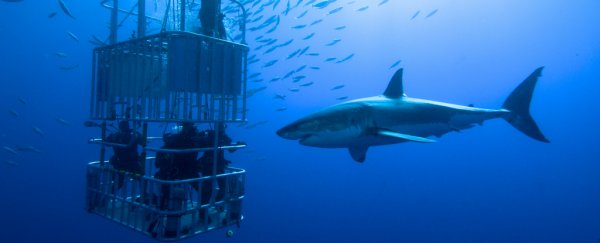There's been some panic in the media the past few months over the apparent increase in shark attacks in Australia in 2015.
And it's true, as of last week there have been 32 unprovoked shark attacks so far this year, compared to 23 in all of 2014, which has led some communities to demand a shark cull be put in place. But according to an expert from the University of Technology Sydney (UTS) Science in Australia, there's no need to panic – and there's definitely no need to start killing animals.
Why? Because a one-off increase doesn't make a trend or a pattern, it just provides more data for scientists to analyse in order to work out what's going on.
It's also worth considering the fact that shark attacks, statistically, are pretty much the least of our worries. On average one to two people die each year from shark attacks in Australia, but between 2013 and 2014, 266 people drowned and 1,193 were killed in road crashes. Even selfies now officially kill more people than shark attacks.
"With just fear and hype to go on, and no reliable data as yet about the number of sharks swimming in our waters, culling is not a logical approach," said Bill Gladstone, a marine biologist from UTS Science.
Many of the attacks have been blamed on white sharks (Carcharodon carcharias), which are a vulnerable – and therefore protected – species. There have been arguments that this protection has increased population numbers and contributed to the increase in shark attacks.
But there's a problem with that argument – there's no evidence that white shark populations have increased at all, and there's definitely no evidence to link population to the number of attacks.
There's also no solid evidence to show that climate change or warming oceans have contributed to the number of incidents.
In an attempt to better understand what's going on, Gladstone has spent the past five years monitoring shark populations on Australia's east coast, using DNA testing and acoustic and satellite tagging, as well as helicopter surveys.
His team has managed to identify one shark nursery between Newcastle and Seal Rocks, 200 kilometres north of Sydney, but other than that, no clear patterns have emerged.
"Throughout most of the year we would see two or three sharks, and then in November, we would see a peak of 60 of them," said Gladstone. "This large increase in the number of juvenile white sharks lasted only a few weeks, before numbers decreased as the sharks moved away."
Another study taking place on New South Wales' south coast has turned up similar results, in a separate, independent initiative south of Sydney towards the beaches of Ulladulla.
"I am in the middle of analysing all their data over 70 years and have found that there is no increase in the numbers of shark," said Duncan Leadbitter, a fisheries consultant and a visiting fellow at the University of Wollongong, referring to data collected.
Importantly, there's also no evidence that shark culls work. Other than costing a lot of money and resulting in the unnecessary deaths of sharks and other marine life, research hasn't shown a link between culling and a reduction in shark attacks.
Gladstone, along with other researchers, is now calling for the government to help fund more research into shark population growth, habits, and attack patterns, so that they can work out the next best step based on reliable data.
So what do we do in the meantime? Get educated about the feeding habits of sharks to reduce your risk of swimming at the same time they're eating.
"Researchers are looking into other shark deterrents such as artificial kelp, bubbles or sound-based systems but none are yet scientifically proven," said Gladstone. "As people entering a marine environment, it's about changing our behaviour not the sharks' – making a judgment and not surfing or swimming after long periods of rain or when there are lots of fish about."
And try not to panic. We may not know much just yet, but the one thing that's for sure is that you have a much greater risk of dying pretty much any other way than by being killed by a shark.
UTS Science is a sponsor of ScienceAlert. Find out more about their research.
